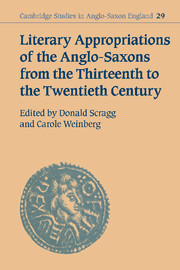Book contents
- Frontmatter
- Contents
- List of contributors
- Acknowledgements
- List of abbreviations
- Introduction. The Anglo-Saxons: fact and fiction
- 1 Victor and victim: a view of the Anglo-Saxon past in LaƷamon's Brut
- 2 Kings, constitution and crisis: ‘Robert of Gloucester’ and the Anglo-Saxon remedy
- 3 The South English Legendary: Anglo-Saxon saints and national identity
- 4 King Ælle and the conversion of the English: the development of a legend from Bede to Chaucer
- 5 Saxons versus Danes: the anonymous Edmund Ironside
- 6 New times and old stories: Middleton's Hengist
- 7 Crushing the convent and the dread Bastille: the Anglo-Saxons, revolution and gender in women's plays of the 1790s
- 8 Anglo-Saxon attitudes?: Alfred the Great and the Romantic national epic
- 9 ‘Utter indifference’?: the Anglo-Saxons in the nineteenth-century novel
- 10 The charge of the Saxon brigade: Tennyson's Battle of Brunanburh
- 11 Lady Godiva
- 12 The undeveloped image: Anglo-Saxon in popular consciousness from Turner to Tolkien
- Index of Anglo-Saxons mentioned in the text
- Index of authors and works cited
8 - Anglo-Saxon attitudes?: Alfred the Great and the Romantic national epic
Published online by Cambridge University Press: 21 September 2009
- Frontmatter
- Contents
- List of contributors
- Acknowledgements
- List of abbreviations
- Introduction. The Anglo-Saxons: fact and fiction
- 1 Victor and victim: a view of the Anglo-Saxon past in LaƷamon's Brut
- 2 Kings, constitution and crisis: ‘Robert of Gloucester’ and the Anglo-Saxon remedy
- 3 The South English Legendary: Anglo-Saxon saints and national identity
- 4 King Ælle and the conversion of the English: the development of a legend from Bede to Chaucer
- 5 Saxons versus Danes: the anonymous Edmund Ironside
- 6 New times and old stories: Middleton's Hengist
- 7 Crushing the convent and the dread Bastille: the Anglo-Saxons, revolution and gender in women's plays of the 1790s
- 8 Anglo-Saxon attitudes?: Alfred the Great and the Romantic national epic
- 9 ‘Utter indifference’?: the Anglo-Saxons in the nineteenth-century novel
- 10 The charge of the Saxon brigade: Tennyson's Battle of Brunanburh
- 11 Lady Godiva
- 12 The undeveloped image: Anglo-Saxon in popular consciousness from Turner to Tolkien
- Index of Anglo-Saxons mentioned in the text
- Index of authors and works cited
Summary
In 1801 the leading radical poet Robert Southey gave his non-literary friend Charles Biddlecombe his private opinion of two recent publications:
Have you seen Cottles Alfred? I do not advise you to buy it – nor the Laureate['s, Henry James Pye's poem of the same name] which is shorter and dearer – in good rhymes and deadlily dull.
The works that he was so very pointedly failing to recommend both had the same title – Alfred, an Epic Poem. The first, in which Southey was probably more involved than he cared to admit, was by his loyal friend and early publisher Joseph Cottle, and appeared in 1800. The second, published less than a year later in 1801, was by Henry James Pye, the ex-politician who had held the post of Poet Laureate since 1790. As their identical titles suggest, both poems were epics (though Cottle's work was about twice as long as Pye's), both had as their central, heroic figure Alfred the Great, and both concentrated on exactly the same period in the Anglo-Saxon king's career (his retreat to the isle of Athelney and his eventual defeat and conversion of the Danish invaders). Moreover, there is another, less commendable, similarity between the two texts. From a late twentieth-century perspective, Southey's negative judgement of both seems to have been right. Neither Alfred is part of the canon, and Cottle and Pye have, respectively, suffered from either ridicule or total neglect.
Information
- Type
- Chapter
- Information
- Literary Appropriations of the Anglo-Saxons from the Thirteenth to the Twentieth Century , pp. 138 - 156Publisher: Cambridge University PressPrint publication year: 2000
Accessibility standard: Unknown
Why this information is here
This section outlines the accessibility features of this content - including support for screen readers, full keyboard navigation and high-contrast display options. This may not be relevant for you.Accessibility Information
- 7
- Cited by
